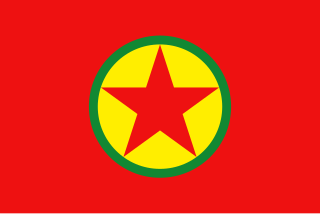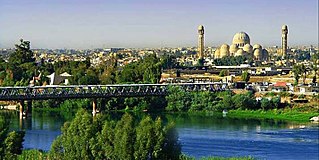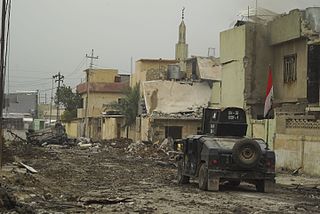
Kurds or Kurdish people are an Iranian ethnic group native to the mountainous region of Kurdistan in Western Asia, which spans southeastern Turkey, northwestern Iran, northern Iraq, and northern Syria. There are exclaves of Kurds in Central Anatolia, Khorasan, and the Caucasus, as well as significant Kurdish diaspora communities in the cities of western Turkey and Western Europe. The Kurdish population is estimated to be between 30 and 45 million.

Kurdish is a language or a group of languages spoken by Kurds in the geo-cultural region of Kurdistan and the Kurdish diaspora. Kurdish languages constitutes a dialect continuum, many of which are not mutually intelligible, belonging to Western Iranian languages in the Indo-European language family. The main three dialects or languages of Kurdish are Northern Kurdish, Central Kurdish, and Southern Kurdish.

The Kurdistan Workers' Party or PKK is a Kurdish militant political organization and armed guerrilla movement which historically operated throughout Kurdistan but is now primarily based in the mountainous Kurdish-majority regions of southeastern Turkey and northern Iraq. Since 1984, the PKK has utilized asymmetric warfare in the Kurdish–Turkish conflict. Although the PKK initially sought an independent Kurdish state, in the 1990s its goals changed to seeking autonomy and increased political and cultural rights for Kurds within Turkey.

Abdullah Öcalan, also known as Apo, is a political prisoner and founding member of the militant Kurdistan Workers' Party (PKK).

Ansar al-Islam in Kurdistan, simply called Ansar al-Islam, also nicknamed the Kurdish Taliban, is a Kurdish Islamist militant and separatist group. It was established in northern Iraq around the Kurdistan Region by Kurdish Islamists who were former Taliban and former Al-Qaeda members, which were coming back from Afghanistan in 2001 after the Fall of Kabul. Its motive is to establish an Islamic state around the Kurdistan region and to protect Kurdish people. It imposed strict Sharia in villages it controlled around Byara near the Iranian border. Its ideology follows a traditionalist interpretation of the Quran and Salafism.

Kirkuk Governorate or Kirkuk Province is a governorate in northern Iraq. The governorate has an area of 9,679 square kilometres (3,737 sq mi). In 2017, the estimated population was 1,259,561 people. The provincial capital is the city of Kirkuk. It is divided into four districts.

Nineveh or Ninawa Governorate is a governorate in northern Iraq. It has an area of 37,323 km2 (14,410 sq mi) and an estimated population of 2,453,000 people as of 2003. Its largest city and provincial capital is Mosul, which lies across the Tigris river from the ruins of ancient Nineveh. Before 1976, it was called Mosul Province and included the present-day Dohuk Governorate. The second largest city is Tal Afar, which has an almost exclusively Turkmen population.

The Peshmerga comprise the standing military of Kurdistan Region, an autonomous political entity within the Republic of Iraq. According to the Constitution of Iraq, the Peshmerga and their security subsidiaries are solely responsible for the security of Kurdistan Region, chiefly due to the fact that the Iraqi Armed Forces are forbidden to enter Iraqi Kurdistan. These subsidiaries include Asayish, Parastin û Zanyarî, and Zêravanî. The Peshmerga's history dates back to the 18th century, when they began as a strictly tribal pseudo-military border guard under the Ottoman Turks and the Safavid Iranians. By the 19th century, they had evolved into a disciplined and well-trained guerrilla force.

"Ey Reqîb" is the Kurdish national anthem and the official anthem of the autonomous Kurdistan Region of Iraq. The poem was written in 1938 by Dildar in Sorani.

Kurdistan Region is an autonomous administrative entity within the Republic of Iraq. It comprises four Kurdish-majority divisions of Arab-majority Iraq: the Erbil Governorate, the Sulaymaniyah Governorate, the Duhok Governorate, and Halabja Governorate. The KRI is bordered by Iran to the east, by Turkey to the north, and by Syria to the west. It does not govern all of Iraqi Kurdistan, and lays claim to the disputed territories of northern Iraq; these territories have a predominantly non-Arab population and were subject to the Ba'athist Arabization campaigns throughout the late 20th century. Though the KRI's autonomy was realized in 1992, one year after Iraq's defeat in the Gulf War, these northern territories remain contested between the Kurdistan Regional Government and the Government of Iraq to the present day. In light of the dispute, the KRI's constitution declares the city of Kirkuk as the capital of Iraqi Kurdistan. However, the KRI does not control Kirkuk, and the Kurdistan Region Parliament is based in Erbil. In 2014, when the Syria-based Islamic State began their Northern Iraq offensive and invaded the country, the Iraqi Armed Forces retreated from most of the disputed territories. The KRI's Peshmerga then entered and took control of them for the duration of the War in Iraq (2013–2017). In October 2017, following the defeat of the Islamic State, the Iraqi Armed Forces attacked the Peshmerga and reasserted control over the disputed territories.

Afrin is a city in northern Syria. In the Afrin District, it is part of the Aleppo Governorate. The total population of the district as of 2005 was recorded at 172,095 people, of whom 36,562 lived in the town of Afrin itself.

The Autonomous Administration of North and East Syria (AANES), also known as Rojava, is a de facto autonomous region in northeastern Syria. It consists of self-governing sub-regions in the areas of Afrin, Jazira, Euphrates, Raqqa, Tabqa, Manbij, and Deir Ez-Zor. The region gained its de facto autonomy in 2012 in the context of the ongoing Rojava conflict and the wider Syrian civil war, in which its official military force, the Syrian Democratic Forces (SDF), has taken part.

The Rojava–Islamist conflict, a major theater in the Syrian civil war, started after fighting erupted between the Kurdish People's Protection Units (YPG) and Islamist rebel factions in the city of Ras al-Ayn. Kurdish forces launched a campaign in an attempt to take control of the Islamist-controlled areas in the governorate of al-Hasakah and some parts of Raqqa and Aleppo governorates after al-Qaeda in Syria used those areas to attack the YPG. The Kurdish groups and their allies' goal was also to capture Kurdish areas from the Arab Islamist rebels and strengthen the autonomy of the region of Rojava. The Syrian Democratic Forces would go on to take substantial territory from Islamist groups, in particular the Islamic State of Iraq and the Levant, provoking Turkish involvement in the Syrian Civil War.

The War in Iraq was an armed conflict between Iraq and its allies and the Islamic State from 2013 to 2017. Following December 2013, the insurgency escalated into full-scale guerrilla warfare following clashes in the cities of Ramadi and Fallujah in parts of western Iraq, and culminated in the Islamic State offensive into Iraq in June 2014, which lead to the capture of the cities of Mosul, Tikrit and other cities in western and northern Iraq by the Islamic State. Between 4–9 June 2014, the city of Mosul was attacked and later fell; following this, Prime Minister Nuri al-Maliki called for a national state of emergency on 10 June. However, despite the security crisis, Iraq's parliament did not allow Maliki to declare a state of emergency; many legislators boycotted the session because they opposed expanding the prime minister's powers. Ali Ghaidan, a former military commander in Mosul, accused al-Maliki of being the one who issued the order to withdraw from the city of Mosul. At its height, ISIL held 56,000 square kilometers of Iraqi territory, containing 4.5 million citizens.

The Syrian Democratic Forces (SDF) is a coalition of ethnic militias and rebel groups which serve as the official armed force of the rebels and militants in Autonomous Administration of North and East Syria (AANES). A US formed and backed alliance of forces formed during the Syrian civil war composed primarily of Kurdish militias with some Arab, Assyrian/Syriac, Armenian, Turkmen and Chechen militias. It is militarily led by the People's Protection Units (YPG), a Kurdish militia recognized as a terrorist group by Turkey. SDF also includes several ethnic militias, and various factions of the Syrian opposition's Free Syrian Army. Founded in 10 October 2015, the SDF claims that its mission as fighting to create a secular, democratic and federalised Syria. According to Turkey, the Syrian Democratic Forces has direct links to the PKK which it recognizes a terrorist group.

The Rojava conflict, also known as the Rojava Revolution, is a political upheaval and military conflict taking place in northern Syria, known among Kurds as Western Kurdistan or Rojava.
2016–present clashes in West Iran refers to the ongoing military clashes between Kurdish insurgent party Democratic Party of Iranian Kurdistan (PDKI) and the Iranian Revolutionary Guards, which began in April 2016. Kurdistan Freedom Party (PAK) and Komalah expressed their support to the Kurdish cause of PDKI as well, with both clashing with Iranian security forces in 2016 and 2017 respectively. In parallel, a leftist Iranian Kurdish rebel group PJAK resumed military activities against Iran in 2016, following a long period of stalemate.

The Syrian Democratic Forces (SDF) has many military councils for local security and defense, each being accountable to the civil council of the area they operate in.

The 2018 Syrian-Turkish border clashes began on 31 October 2018 when the Turkish Armed Forces began to shell People's Protection Units (YPG) positions near the cities of Kobani and Tell Abyad as well as surrounding villages. Turkey views the YPG as an extension of the outlawed Kurdistan Workers' Party (PKK), which has been waging an insurgency in Turkey for over 40 years.















